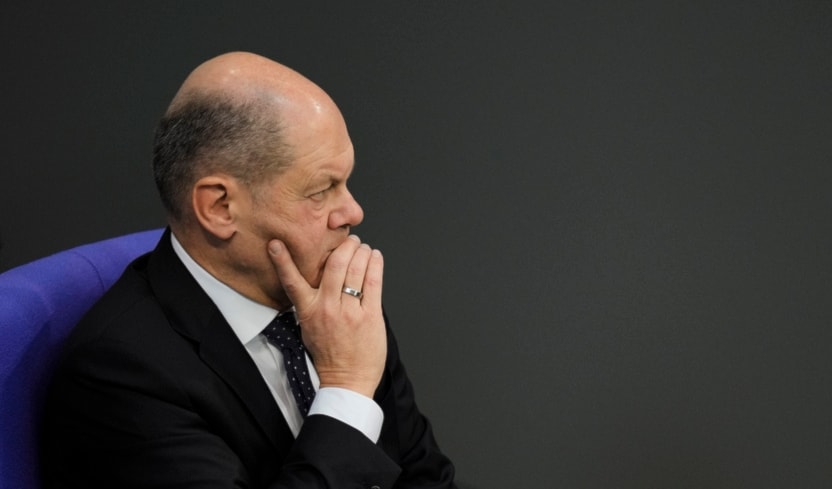Scholz accused of 'financial trickery' in plan for 2024 Ukraine aid
German Chancellor Olaf Schulz puts forward a plan to circumvent Berlin's fiscal rule known as the "debt brake" to supply Ukraine with enough aid to make up for the faltering Western support.
-

German Chancellor Olaf Scholz attends a debate about Germany's budget crisis at the parliament Bundestag in Berlin, Germany, Tuesday, Nov. 28, 2023. (AP)
In a plan dubbed by the opposition as "financial trickery," German Chancellor Olaf Scholz warned parliament, in a government statement, that Germany might need to declare a state of emergency at home in order to provide Kiev with assistance in 2024, in the event the situation in Ukraine worsens.
While the German opposition, the Christian Democratic Union (CDU), vowed to never let it happen, the chancellor stressed that he would "advocate sustainable, reliable support for Ukraine, because it is about the security of Europe," during an address in front of the Lower House of Parliament, the Bundestag.
The current government coalition in Berlin, following weeks of tense negotiations, has reached a deal on the 2024 budget which noted the need to maintain existing debt restrictions while cutting operational costs across various departments. The budget, allegedly, will also slash a number of climate subsidiaries, with boosting military and financial support to Kiev remaining a top priority.
What this aid to Ukraine entails is $8.63 billion in arms, an unspecified amount to be allocated as financial aid to the Kiev budget, and $6.47 billion to be allocated to support Ukrainian refugees residing in Germany.
"It is… clear that, if the situation worsens… because other supporters withdraw their aid, then we have to react to it," Scholz explained, claiming that Russia counts on the faltering Western support to Kiev that "the danger that calculation could work cannot be dismissed."
Berlin forced to spend more if Western aid diminishes
Scholz underscored that in the event the Western support for Kiev diminishes, Berlin will be forced to spend greater amounts to aid Ukraine and thus might require a special emergency clause from the government to circumvent legislation on the national debt.
"We have already decided to propose a debt-brake exception resolution in the Bundestag" in case of such a development, the chancellor highlighted.
In 2009 Germany, a fiscal constraint known as the 'debt brake' was enacted, limiting the national budget deficit to 0.35% of GDP and restricting the issuance of new government bonds. A special clause continues to allow the government to circumvent these constraints in the event of an "unforeseen emergency."
CDU leader Friedrich Merz underscored that "What you have presented as an orderly procedure has been a tangible government crisis" stressing "We won’t let this trick go through."
"You know that, under the current circumstances, this country has no chance at all of winning this war," and it is clear that the circumstances in Kiev have become "more dramatic", Merz explained.
In turn, the Chairman of the CSU in the Bundestag, Alexander Dorbrindt, told Scholz "You are not the solution to the budget problem, you are the budget chaos per se." Dorbrindt also accused the chancellor of being prepared to practically devastate Germany's finances in order to assist Kiev, stressing he would "never" get consent from the CSU to bypass the debt-brak rule.
Biden pledges another $200mln to Kiev despite Republican opposition
In a similar context, US President Joe Biden has pledged to send an additional $200 million in aid to Ukraine, as discussed in a meeting with Ukrainian President Volodymyr Zelensky on Tuesday.
This comes after Congress Republicans blocked a bill to send military aid worth almost $60 billion to Kiev. Republicans are more openly rejecting the need to fund Ukraine, saying that President Biden needs to devote more attention to domestic security, particularly to stopping illegal migration over the US-Mexican border.
Conservatives insisted on linking their approval of the package for these close foreign allies to Democrats and the White House agreeing to comprehensive immigration reforms. As per recent and popular demands, it is very unlikely that the House will pass any aid to Ukraine unless packaged with funds to secure the US-Mexican border.
Moreover, it was noted that Zelensky must also strategize clearly, as funds were perceived to be sent to a battle that did not yield the anticipated results. Republicans have also questioned whether Ukraine should keep fighting at all.
It is worth noting that Biden's allocation of $200 million in aid does not rely on Congress' approval, instead, the Presidential Drawdown Authority (PDA) will be supplying Kiev with US stock weaponry for the 44th time since the war began.
Read more: Germany paying 2.5 times more for Gas in 2023 compared to 2021

 4 Min Read
4 Min Read









